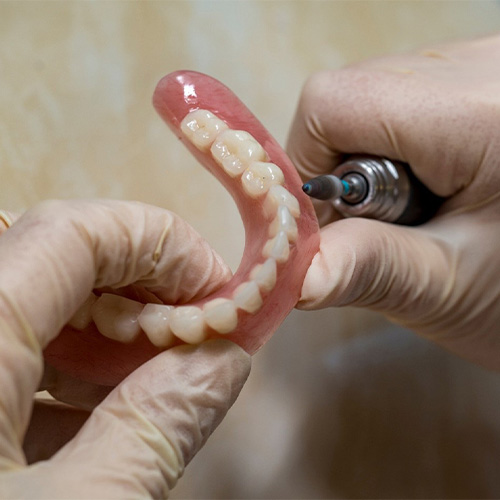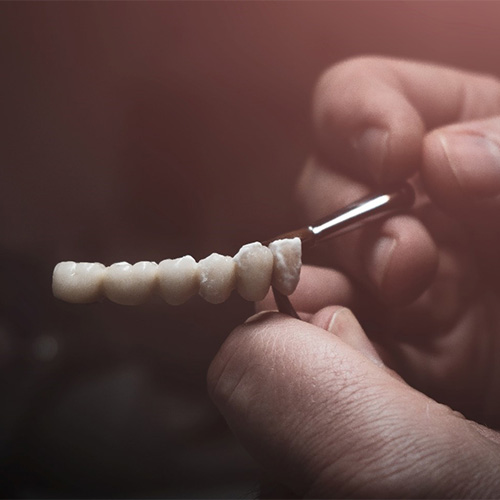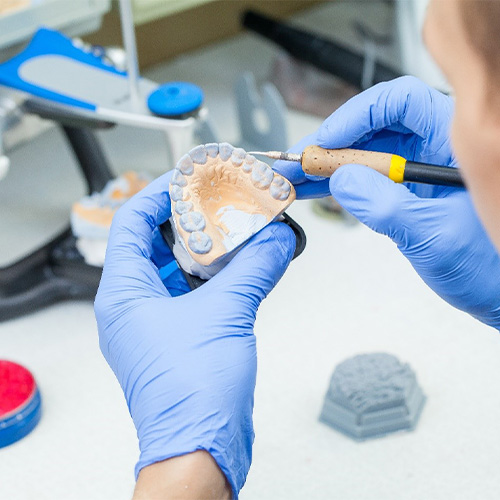
Full and Partial Dentures – Indian Land, SC
Restore Your Smile in Record Time
About 178 million Americans are missing at least one tooth, with 40 million of them missing all of their teeth. Because this problem is so common, dentists all over the world have developed all kinds of ways of replacing those missing pearly whites. Two tried-and-true methods are full and partial dentures in Indian Land, SC. These artificial teeth are anchored onto a plastic base the color of gum tissue and fit snugly over your gums to restore your smile in record time. They also restore up to 70% of your original biting force. To learn more about how dentures can benefit you, keep reading below, or just give us a call.

Why Choose BridgeMill Dental Care for Dentures?
- Lifelike Materials Used to Create Restorations
- Restore the Majority of Your Biting Power
- Relaxing Dental Office with Sedation and TX for Comfort
Who’s a Good Candidate for Dentures?

Dentures are an incredibly lifelike and reliable solution for those missing several or all of their teeth. No matter how many you’ve lost or where in the mouth they were located, our team can personalize your prosthetic to fit your exact dental needs. Before going forth with your treatment, we’ll need to ensure that you’re in great condition and can maintain your dentures for the long term, meaning we’ll need to address any underlying problems first.
Effects of Missing Teeth

Tooth loss can occur for numerous reasons; the most common ones being gum disease, tooth decay, and physical injury. However, missing some or all of your teeth can do much more than negatively impact your oral health. Not only will your jawbone deteriorate due to a lack of stimulation from tooth roots, but you’ll also have difficulty in many other daily habits, such as talking, chewing, and smiling. Those who suffer from tooth loss also often experience sorrow and anxiety about their appearance, making them unlikely to participate in social activities. With dentures, however, you can be sure to alleviate many of these issues after just a couple of visits!
What Qualifies You for Dentures?

As one of the most convenient and effective methods of replacing teeth, dentures can best help those who are struggling with any number of missing pearly whites. Of course, to wear the prosthetics, you’ll need to have sufficient and strong gum tissue and jawbone density. To preserve them for the long term, you should also be committed to practicing good oral hygiene every day as well as visiting your dentist every six months for checkups.
The type of denture that you’ll get will mostly be based on the number of teeth that you’re missing. This means you can expect to get a partial, full, or even an implant denture depending on your situation. This treatment is also an excellent solution if you’re working with a budget, as it’s the most affordable method of restoring your bite.
Alternative Tooth-Replacement Options

If dentures aren’t in the books for you, that’s okay! Our team offers additional ways to replace missing teeth, including:
- Dental Bridges: These “bridges” consist of two dental crowns connected by pontics to close the space in your smile. This treatment can typically replace one to three teeth in a row, and it requires removing a small amount of enamel from the healthy teeth on either side of the gap to make room for the crowns.
- Dental Implants: These are titanium posts that can be strategically placed in the jawbone to provide a natural-feeling foundation for your brand-new teeth. While this involves minor oral surgery and a higher upfront cost, the results will feel completely normal and can last a lifetime as long as you take great care of them.
The Difference Between Full and Partial Dentures

There are two types of dentures: full and partial. Full dentures are what you probably think of when someone says the word “dentures.” They consist of a gum-colored plastic base and an entire arch of porcelain teeth. The denture stays in place in the mouth by using a natural suction against the gums. If that’s not enough, you can use denture adhesive, which can be found at most pharmacies.
Partial dentures are used when a patient is missing several teeth on either side of an arch. They can be made up of either a plastic base or a metal framework that supports the number of teeth the patient needs replaced. The metal framework is designed around the remaining teeth and uses clasps to attach itself to them.
The Process of Getting Dentures

To begin the process of getting dentures, Dr. Candon, your dentist in Indian Land, will take impressions of your gums (and remaining teeth, if you’re receiving a partial denture). Then, he’ll work with a laboratory technician to use these impressions to create your future smile. For about four to five weeks, you’ll need to come in and see us about once a week as we work to craft your denture to make sure they fit properly and restore your smile and biting force to the fullest. You’ll also need to return to our dental office a few times during the first month or so after your denture is completed so that we can adjust it accordingly.
Implant-Retained Dentures

While traditional dentures do an excellent job of restoring the quality of your smile and staying in place, they have been known to lose their fit every five to ten years as your mouth changes. To prevent this from occurring, we offer an alternative called implant-retained dentures. They involve placing an average of four to six dental implants throughout your jawbone in the places where they will provide the most support for a denture. Then, your denture is placed on top of those implants, and can be either fixed or removable, depending on your preference. Because dental implants essentially become a part of you, they won’t lose their fit over the years or require replacement. In fact, if you take excellent care of your implant-retained dentures in Indian Land, they can even last for the rest of your life!
How Dentures Are Made

Everyone’s smile is entirely different, so dentures are always custom-made. This means that dentures require a multi-step process to ensure that they look and feel just right. Continue reading to learn about what makes up dentures and how they are created.
What Are Dentures Made Of?

Dentures are comprised of two different parts – the base and the replacement teeth. Here’s what each one looks like:
- Base: The base of the dentures is the structure that supports the replacement teeth. It can be made from a variety of different materials, including acrylic, nylon, and resin. Most of the time, acrylic is chosen because it can be tailored to closely resemble gum tissue. This results in a more natural-looking appearance.
- Teeth: The replacement teeth are secured onto the denture base. In most cases, the teeth are made from resin or porcelain because they look and feel just like tooth enamel. It is even similar in the way it reflects light. Because porcelain can be abrasive against natural teeth, it is usually only recommended for full dentures.
The Denture Creation Process

- Your dentist will begin by taking measurements of your jaw and impressions of your mouth. This is used to create a model to match the shape and size of your mouth.
- The model is sent to the dental laboratory where your dentures will be made. First, a wax replica of your gumline is created. Then, the replacement teeth are set into place using a mechanical device called an “articulator.” Adjustments are made by a lab technician.
- These wax dentures are sent back to the dentist for a fitting. If everything looks good, they are returned to the dental lab to finish the process.
- After the dentures are back in the lab, the wax needs to be replaced with acrylic. To do this, the lab technician places the dentures into a flask. Plaster is poured into the flask to maintain the shape of the dentures. Then, the entire flask is placed in hot water to melt the wax.
- The plaster is carefully removed from the dentures using dental tools. The dentures are then placed in an ultrasonic bath to wash away the rest of the plaster.
- Any excess acrylic is cut from the dentures. Then, they are polished to perfection.
- Now that your dentures are finished, they are returned to the dental office so you can try them on. If you and your dentist are happy with the results, you can leave showing off your new and complete smile.
Adjusting to Your New Dentures

Once you get your dentures, you might experience some soreness, but this is nothing to worry about. Temporary discomfort is completely normal and common as one adjusts to their new prosthetic. After some time, your dentures will begin to feel more and more like your natural teeth. Just remember to stick to softer foods and exercise your facial muscles. If discomfort persists or you have any concerns about your dentures, don’t hesitate to give us a call.
The Benefits of Dentures

Decade after decade, patients continue to choose dentures to restore the look, health, and function of their smiles. Why? Well, this tried-and-true tooth-replacement solution comes with numerous benefits, including the following:
Custom-Made for Each Patient

If you haven’t seen modern dentures, you might have a vision of how they look from decades ago. However, the restorations crafted today are considerably more lifelike thanks to significant advancements in both dentistry and technology. Plus, they are custom-made for each patient, ensuring they look as great as they feel.
Restored Self-Esteem

Tooth loss – whether minor or more advanced – can take a serious toll on your self-esteem. In fact, it’s common for patients to experience a considerable shift in their personality and overall demeanor as a result. The good news is that dentures can help on this front. Not only is this restoration custom-made from lifelike materials, but they are custom-made so they stay securely in place. So, you can smile, laugh, chew, and talk without worry.
Clearer Enunciation

Another downside of tooth loss is that it can make it difficult to enunciate clearly, which makes communicating with the people around you quite hard. Fortunately, partial and full dentures can fill the open spaces perfectly. While you may experience a slight learning curve when you first get your restoration, you can have peace of mind knowing it won’t be long until you’re talking like usual again!
Varied Diet

If you’re missing teeth, then you know all too well how difficult it can be to eat anything that isn’t soft. As a result, you may have adapted your diet to include foods like oatmeal, plain yogurt, and vegetable soup. While there’s nothing wrong with any of these, it can get boring day-in and day-out. There’s good news though: dentures can help restore the strength of your bite so you can enjoy a wide range of foods again!
Preserves Oral Health

Have you heard of dental drift? This is when the teeth surrounding the gap begin to move. If this happens to you, then you can experience numerous consequences, including a significant change in your bite. This is just one of the many ways tooth loss can negatively affect your oral health, and, as you may have guessed, another reason dentures are worth considering.
Cost-Effective
Today, there are multiple tooth-replacement options available. While some require a higher upfront investment, dentures are relatively affordable, especially since they are usually covered in part by dental insurance providers. Even implant dentures, which look expensive at first, have the potential to last for decades with proper care, so they very well might be the best choice for your wallet.
Cost of Dentures

Are you curious about the cost of dentures in Indian Land? The best way to receive a precise estimate is to contact our office for a consultation. However, we have also included some of the most significant factors that influence the total cost of your treatment, so you have easy access to the information you need. Read on to learn about the price of dentures and see why they’re always worth the investment.
Learn More About the Cost of Dentures
Types of Dentures
We offer different types of dentures for various patterns of tooth loss. Typically, the more teeth you’re missing, the higher your overall cost will be. For a randomized pattern of tooth loss, we may recommend partial dentures, which fill in the gaps like missing pieces of a puzzle. If you’re missing all or most of your teeth, we have full dentures to restore your entire smile. Lastly, for the most stable set of teeth, we can combine dental implants with dentures to give you implant-retained dentures. This option will cost significantly more than the others because it involves the surgical placement of dental implants.
What Are the Stages of Treatment with Dentures?
First, you will attend an initial consultation, where we will examine your mouth to check the condition of your oral health and the number of teeth you’re missing. We will need to treat any preexisting dental issues, including the extraction of remaining teeth if we are placing full dentures. Next, we’ll take special images and impressions of your smile, which are used to create your dentures. Once your dentures are custom-made at a high-tech dental lab, you’ll come back into our office, where Dr. Candon will ensure that you’re happy with your results. Keep in mind that implant-retained dentures require surgery as well as a 3 to 5 month-long healing process.
Are Dentures Worth the Investment?
Dentures do require an investment, however their benefits are well worth it. After getting your new prosthesis, you’ll be able to eat, speak, and grin with confidence once more. If you’ve been hiding your smile in public due to your missing teeth, dentures can give you the self-esteem boost you need to be successful in your social and professional lives. Plus, a complete set of teeth fills out your facial appearance, allowing you to look healthier and more youthful. The best part is that we have different types of dentures based on your specific needs, so we can choose the prosthetic that will help you the most.
Does My Dental Insurance Cover Dentures?
Typically, most dental insurance plans will partially cover your dentures. This is considered a major restoration, which is why your provider will usually cover around 50% of your treatment. On average, a well-made denture costs around $1,200. However, no two smiles are the same, which is why this price can vary. It’s important to understand that this will vary based on your specific plan, so be sure to contact our office if you have any questions. Our front desk team is always happy to help you understand the cost of your dentures and maximize your benefits to give you the most affordable solution available.
If you have any questions, please don’t hesitate to contact our office!
Dentures Aftercare

Dentures can last anywhere from five to seven years before they need to be replaced. However, to achieve this, you must take all the right steps to care for them. Even if you don’t have any remaining teeth, it’s still crucial that you see your dentist for regular cleanings and checkups. This way, they can continue monitoring your gum tissue and existing teeth. They will also be on the lookout for abnormalities that could indicate oral cancer.
Removable Dentures
Remove After Eating

After you finish a snack or a meal, you should get into the habit of rinsing your dentures. This will help to prevent the buildup of food debris and plaque. You should also be sure that the water you are using to rinse isn’t too hot. High temperatures can warp the denture material, causing it to no longer fit properly.
Clean Your Restoration
When it’s time to clean your dentures, you should take them out first. Using a soft-bristled toothbrush and a small amount of unscented hand soap, mild dish soap, or denture cleaner, gently brush your dentures. You should avoid using regular toothpaste on your dentures because it is too abrasive. If you aren’t going to be wearing your dentures again right away, place them in a container of water or denture-cleansing solution so they don’t dry out. Remember to always rinse your dentures thoroughly before placing them back into your mouth.
Keep Your Dentures Safe
Before cleaning your dentures, place a towel beneath you. This way, if they accidentally slip out of your hands, they are less likely to break. When you aren’t wearing your dentures, make sure they are out of reach of any small children or curious pets.
Remove Dentures When You Sleep
When it’s time to go to bed, you should take out your dentures. This is because wearing dentures restricts the circulation in your gums, leading to soft-tissue irritation. Sleeping with dentures has also been associated with higher levels of gum and tongue plaque. When you are sleeping, keep your dentures in a denture-soaking solution. If you allow them to dry out, they could permanently lose their shape.
Notice Changes
Be on the lookout for changes going on in your mouth. This includes mouth sores, gum irritation, and signs of infection. If your dentures become damaged, you shouldn’t attempt to repair them on your own. Instead, give us a call so we can assist you.
All-on-4 Dental Implants

If you have all-on-4 dental implants, the aftercare process is a little bit different. You should brush your dentures twice daily using a soft-bristled manual or electric toothbrush and nonabrasive toothpaste. Floss your replacement teeth every day. You should also consider investing in a water flosser. For extra freshness, use an antibacterial mouthwash.
Frequently Asked Questions
Replacing your missing teeth is a big step, so you may want to make sure you fully understand dentures before you move forward. We completely understand that! In fact, Dr. Candon and the rest of our team at BridgeMill Dental Care are here to answer your questions about this treatment. Take a few minutes to look at our responses to the ones below. Do you have more questions? You can reach out to our Indian Land office to schedule a consultation with Dr. Candon.
Can I Sleep with Dentures in My Mouth?
Unless you have permanently affixed, implant-retained dentures, you need to remove your dentures and soak them every night. While you sleep, your mouth produces less saliva, which allows bacteria to grow quickly on your dentures. Although not susceptible to cavities, your dentures can develop calcium buildup and make it easier for your gums to become infected or for any remaining teeth to fall victim to decay. To help keep both your mouth and your dentures in tip-top shape, you need to soak your dentures before your go to bed.
What Maintenance Do Dentures Require?
In many ways, you need to take care of your prosthetic teeth just as you would natural ones. At least twice every day, you need to brush your dentures gently. If they are removeable, take out your dentures when you brush them and rinse them off regularly in warm water. Do not use hot water, or you’ll risk warping the acrylic base. When you soak your dentures at night, you can use a dental cleanser to get rid of bacteria as well.
What Should I Do if My Dentures Break?
While you’re brushing your dentures or removing them at night, be careful! Dropping them can easily cause cracks or other damage to your dentures. If this occurs, you need to call our office right away. Trying to use broken dentures can make eating difficult or even downright painful. The sooner you contact and see us, the sooner we can provide you with a replacement denture and enable you to eat comfortably again.
Why Do I Need to Continue Coming to the Dentist Regularly?
Even if you’ve lost every tooth in both arches, you still should visit with Dr. Candon at least every six months for dental checkups. During these appointments, he can inspect your dentures for damage, make any necessary adjustments, and make sure they are fitting you properly. Also, if your dentures have accumulated stains from coffee or smoking, we can remove them without harming the materials. Dr. Candon can also check to make sure your gums are infection free.